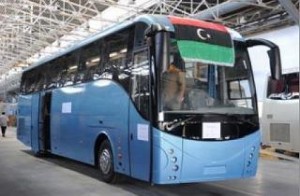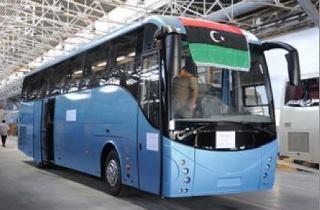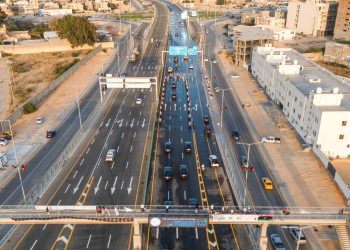Tripoli, 6 May:

The Ministry of Industry celebrated today, Sunday, the complete manufacture of the first post-17 February Revolution passenger bus by . . .[restrict]the Truck and Bus Company, based in the Tajura Industrial Zone on the eastern outskirts of Tripoli.
The celebration was attended by the Undersecretary of the Ministry of Industry, the Undersecretary of the Ministry of Economy, the Director General of Customs, the General Manager of the Tax Department, and a number of departmental directors of the Truck and Bus Company, as well as a number of employees of the company.
The company Manager, engineer Mohammed Andulsy, said that the bus was completely Libyan designed and manufactured and enjoyed international specifications having a capacity of 49 passengers and a 450 bhp engine and has the most sophisticated options.
He pointed out that the expected use for this bus will be the transport of passengers between the sprawling areas in Libya because of the comfort for travelers that the bus offers.
For his part, the Bus Factory Manager of the company said the bus is very modern and can be used in the transfer of tourist groups to different areas in Libya as it is equipped with both TV and radio, a very high quality air condition system and can hold ample luggage.
It is worth noting that the Ministry of Transport had put out a tender a few weeks ago for companies to bid for the supply of public transport buses for Libya (see Tenders section in Libya Herald). However, the deadline published was subsequently postponed without giving any reason. It is believed that the Libyan factory wanted more time so as to give it a better chance to bid for part of the tender.
The Truck and Bus Company has had a long-standing agreement to assemble trucks and buses with the Italian company IVECO, and is probably better know for the thousands of IVECO ‘Daily’ white micro buses that carry most of Libyan passengers all over Tripoli.
The speedy production of the first post revolution bus by the local factory could be seen as an attempt by it to save itself from closure as it tries to prove that it can survive purely on a business bases.
It is to be recalled that many, if not most, of the state-owned enterprizes have been loss-making operations for decades under the previous regime and were in the process of liquidation and closure. They were seen as sources of corruption, job formation and a means of hiding unemployment.
There is no doubt that both the present Transitional Government and the post-election Temporary Government will be under immense political pressure to keep the factory going in order to create jobs for the masses of unemployed Libyan youth. However, it remains to be seen if the factory is able to operate profitably and if it is able to compete with Far Eastern imports – without any subsidies? [/restrict]








